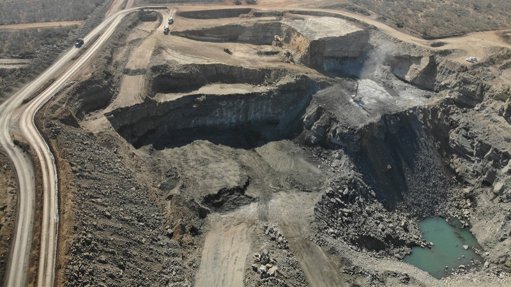Partnership to support training and skills development
South African plastic pipes industry facilitator, the Southern African Plastic Pipe Manufacturers Association (Sappma) has signed a memorandum of understanding (MoU) in November 2013 with the South African Institution of Civil Engineering (Saice) to expand its reach to the new generation of engineers entering the South African market.
Sappma CEO Jan Venter says the associa-tion has been struggling to create interest in the industry among the youth. He maintains that reaching out to young engineers is important in ensuring that the future of the pipes industry in the country is guaranteed an influx of graduates with qualifications to further develop the sector.
He says a partnership with an organisation of Saice’s calibre is exactly what the associa-tion needs to increase its presence.
“Saice is an influential association and, with our target audience being largely civil engineering linked, greater access to them is ensured. “With Saice’s backing, Sappma will be able to participate in graduate engagement programmes at various universities in the country and spread the message about the need for engineers who are dedicated to advancing the pipes and plastic industry,” Venter adds.
Some of the areas of cooperation, agreed upon in the MoU, include the mobilisation of resources, where the two parties have agreed to support each other in the implementation of their activities and plans that fall within the framework of the MoU.
The parties will also have regular consul-tation sessions to advise each other on their programmes and activities.
The agreement also entails a commitment to enhance and support each party in creating and maintaining relations with similar international institutions, as well as raising awareness in publications and on varying media platforms about each other’s activities.
The MoU encourages the two parties to cooperate to lobby and challenge statutory legislation and structures to facilitate the achievement of their common objectives.
One of the first tasks of cooperation is that Saice assists in distributing – from its book-shop and e-sales facility – Sappma’s recently published technical manual for engineers. The 2013/14 manual was released in October last year and provides technical information on the selection of plastic pipes for water supply and wastewater disposal projects.
The manual can be ordered on Sappma and Saice’s websites. The document is also available in Saice’s walk-in bookstore.
Venter says it is important for Sappma to publish a manual that provides basic infor-mation about quality requirements pertaining to plastic pipes for businesses and individuals.
“Pipelines form a key part of South Africa’s infrastructure and sustainability should be taken into consideration. “Modern plastic pipe materials are easily suitable for 100-year lifetimes and engineers involved in the specification processes need to be equipped with the most recent and independent design information when decisions are being made,” he explains.
Plastic Pipes’ Environmental Impact Tested
Sappma conducted a study in the beginning of 2013 that investigated the environmental footprint resulting from the manufacturing and use of plastic pipes. In April 2013, the association released the results of the study, which found that using plastic pipes and plastic raw material is more effective in efforts to conserve the environment than any other material.
The study found that the use of plastic reduces greenhouse-gas emissions by 120-million tons a year.
“The dramatic increase in the population, industrialisation and urbanisation of the modern world is making people realise that current energy sources are limited and bound to be depleted unless they are better preserved.
“This has led to an increased awareness of the quantum of energy to produce, operate and maintain systems. “Piping systems are costly elements of infrastructure and it is, therefore, necessary to evaluate the associated energy costs,” Venter explains.
The study also assessed the overall amount of energy that is needed to extract plastic raw material and to manufacture and maintain pipes, says Venter.
He adds that several factors were taken into consideration when the study was con-ducted, such as the size of the pipe, the type of material used to manufacture it, the dura-bility of the pipe system, the amount of energy and maintenance required in the pipe’s life span, the use of recycled material in the manufacturing of the pipe and whether the pipe would be recyclable after its use.
The study also found that, owing to its low mass, the cost of transporting plastic pipes is considerably less than that of steel or concrete pipes.
Venter adds that, with plastic pipe, the amount of electricity used while pumping fluids through pipelines was found to be considerably lower.
“It is estimated that 60% of the world’s electricity is used by electric motors and that 20% of this is used for pumping. “The walls of a plastic pipe offer limited resistance to flow and, even more importantly, they remain virtually unchanged throughout their design life, mostly because of the specific properties of plastic pipe,” he explains.
This means that the costs of using plastic pipes during a pumping process are less, compared with pipes made out of steel, concrete and other material.
Venter adds that using plastic pipes further reduce costs because they are easily recyclable.
“Plastic pipes are not wasted and, therefore, do not contribute to environmental pollu-tion,” he says, adding that 100% of recycled pipes can be reused, with Sappma stipulating that they be reused only in noncritical applications.
Article Enquiry
Email Article
Save Article
Feedback
To advertise email advertising@creamermedia.co.za or click here
Press Office
Announcements
What's On
Subscribe to improve your user experience...
Option 1 (equivalent of R125 a month):
Receive a weekly copy of Creamer Media's Engineering News & Mining Weekly magazine
(print copy for those in South Africa and e-magazine for those outside of South Africa)
Receive daily email newsletters
Access to full search results
Access archive of magazine back copies
Access to Projects in Progress
Access to ONE Research Report of your choice in PDF format
Option 2 (equivalent of R375 a month):
All benefits from Option 1
PLUS
Access to Creamer Media's Research Channel Africa for ALL Research Reports, in PDF format, on various industrial and mining sectors
including Electricity; Water; Energy Transition; Hydrogen; Roads, Rail and Ports; Coal; Gold; Platinum; Battery Metals; etc.
Already a subscriber?
Forgotten your password?
Receive weekly copy of Creamer Media's Engineering News & Mining Weekly magazine (print copy for those in South Africa and e-magazine for those outside of South Africa)
➕
Recieve daily email newsletters
➕
Access to full search results
➕
Access archive of magazine back copies
➕
Access to Projects in Progress
➕
Access to ONE Research Report of your choice in PDF format
RESEARCH CHANNEL AFRICA
R4500 (equivalent of R375 a month)
SUBSCRIBEAll benefits from Option 1
➕
Access to Creamer Media's Research Channel Africa for ALL Research Reports on various industrial and mining sectors, in PDF format, including on:
Electricity
➕
Water
➕
Energy Transition
➕
Hydrogen
➕
Roads, Rail and Ports
➕
Coal
➕
Gold
➕
Platinum
➕
Battery Metals
➕
etc.
Receive all benefits from Option 1 or Option 2 delivered to numerous people at your company
➕
Multiple User names and Passwords for simultaneous log-ins
➕
Intranet integration access to all in your organisation


















